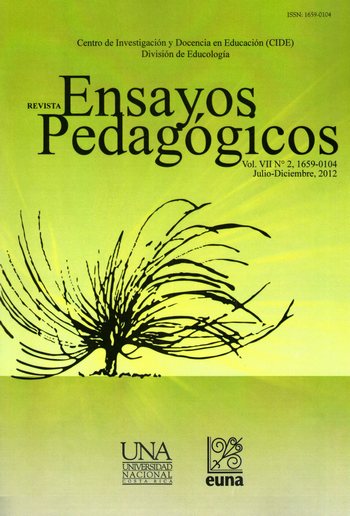The Importance of Developing our Teaching Philosophy as EFL Professionals
DOI:
https://doi.org/10.15359/rep.7-2.3Keywords:
language teachers, teaching philosophy statement, learning, self-development, professionalismAbstract
Creating our own teaching philosophy statement is an innovative practice, and it should be a meaningful part for teachers since it states the learning experiences, goals, beliefs, level of professionalism and self development among many other elements. Some teachers usually write a teaching philosophy statement just to carry out a school assignment or to complete their résumé. However, in real life, teachers do not often implement all the nice ideas that are stated in their teaching philosophy statement. The goal of this paper is to make EFL teachers reflect on the importance of developing this practice in the foreign language teaching field to show their learning and growth throughout time.
References
Atkinson, M. (2000). Your teaching philosophy. Retrieved on from http://www.uwo.ca/tsc/resources/publications/newsletter/selected_articles/your_teaching_philosophy.html
Brookfield, S. (1990). The skillful teacher. San Francisco, CA: Jossey-Bass.
Center for Teaching and Learning. (2008). Assessing your teaching philosophy draft. Retrieved from http://www1.umn.edu/ohr/teachlearn/tutorials/philosophy/assess/index.html
Coppola, B. (2002). Writing a statement of teaching philosophy: Fashioning a framework for your classroom. Journal of the College of Science Teaching 31.7, 448-53. Retrieved from http://galois.math.ucdavis.edu/UsefulGradInfo/HelpfulAdvice/ProfDev/Coppolla_TeachingStatement.pdf
Goodyear, G. E. & Allchin, D. (1998). Statements of teaching philosophy. Retrieved from http://sunconference.utep.edu/CETaL/resources/stofteach
Grundman, H. (2006). Writing a teaching philosophy statement. Notices of the AMS. 53(11) ,1329-1333. Retrieved from
Kenny, N. (2008). Developing a statement of teaching philosophy. Retrieved from http://www.tss.uoguelph.ca/id/ta/tapdfs/A%20Workshop%20on%20Developin2a%20Statement%20of%20Teaching%20Philosophy.pdf
O’neal, C., Meizlish, D., & Kaplan, M. (2007). Writing a statement of teaching philosophy for the academic job search. Retrieved from http://www.crlt.umich.edu/publinks/CRLT_no23.pdf
Schonwetter, D. J., Sokal, L., Friesen, M., & Taylor, K.L. (2002) Teaching philosophies reconsidered: a conceptual model for the development and evaluation of teaching philosophy statements. The International Journal for Academic Development, 7, 83-97.
Virginia Teaching Resource Center. (2004). Developing your reflective teaching statement. Retrieved from http://trc.virginia.edu/Programs/TPT/PDFs/S4_RTS.pdf
Downloads
Published
How to Cite
Issue
Section
License
Ensayos Pedagógicos is subscribed to the Attribution-NonCommertial-NoDerivatives 4.0 International Creative Commons Licence, which allows both authors and readers to freely download, store, copy, and distribute the final approved publisehd version of the manuscript (post-print) as long as this is done without commercial purposes, no derivative works are generated, and the source and author are mentioned. As well, Ensayos Pedagógicos declares that authors will remain the rightful owners of the copyrights of their work in perpetuity.







